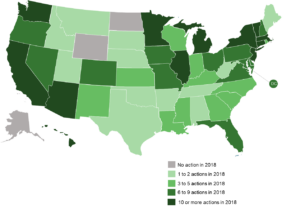The 50 States of Electric Vehicles: 47 States and DC Took Action on Electric Vehicles During 2018
Raleigh, N.C. – (February 14, 2019) The N.C. Clean Energy Technology Center (NCCETC) released its 2018 annual review and Q4 2018 update edition of The 50 States of Electric Vehicles. The quarterly series provides insights on state regulatory and legislative discussions and actions on electric vehicles and charging infrastructure.
The report finds that 47 states and the District of Columbia took actions related to electric vehicles and charging infrastructure during 2018 (see figure below), with the greatest number of actions relating to DC fast charging station deployment, followed by Level 2 charging station deployment, rebate programs, and rate design for Level 2 charging.
2018 State and Utility Action on Electric Vehicles

The report highlights ten of the top electric vehicle trends of 2018:
- States clarifying Commission jurisdiction over electric vehicle charging stations;
- Utilities proposing demand charge reductions or alternatives for fast chargers;
- Governors establishing statewide zero-emission vehicle goals;
- States addressing the future of transportation infrastructure funding;
- Utilities collecting data on electric vehicle charging patterns;
- Utilities focusing on different methods to promote off-peak charging;
- Utilities and stakeholders finding agreement on electric vehicle programs;
- State agencies publishing spending plans for Volkswagen settlement funds;
- States and utilities investing in electric buses and charging infrastructure; and
- Utilities piloting vehicle-to-grid capabilities.
“The most active states of 2018 were engaged in a variety of actions to encourage electric vehicle adoption and charging infrastructure development,” said Allison Carr, Clean Transportation Specialist at NCCETC. “Many of these states are conducting statewide planning initiatives and involving a full spectrum of stakeholders to remove barriers and dedicate resources to transportation electrification.”
A total of 424 electric vehicle actions were taken during 2018, representing an 87% increase over 2017. The report notes the top ten states taking the greatest number or most impactful actions in 2018 were:
- California, where regulators approved major transportation electrification plans and the state legislature enacted several bills related to electric vehicles;
- New Jersey, where Atlantic City Electric and PSE&G proposed new electric vehicle programs and the Governor signed onto the multi-state zero-emission vehicle memorandum;
- New York, where regulators considered several rate design proposals for electric vehicle charging and the Governor announced an initiative to expand charging infrastructure;
- Massachusetts, where regulators approved National Grid’s Phase I electric vehicle program and considered its Phase II plan, while lawmakers prohibited HOA restrictions on charging stations;
- Maryland, where regulators considered an expansive electric vehicle program covering the state’s four investor-owned utilities;
- DC, where Pepco filed a revised transportation electrification proposal and the City Council created a new charging station pilot program;
- Nevada, where the Commission approved NV Energy’s electric vehicle program, determined that utilities may own charging stations, and considered a rate tariff for fast charging stations;
- Minnesota, where regulators addressed electric vehicle charging in an investigatory proceeding and considered electric vehicle charging investment and rate proposals from Xcel Energy;
- Missouri, where regulators considered a utility rebate program and the Court of Appeals ruled that the Commission has jurisdiction over Kansas City Power & Light’s charging stations; and
- Pennsylvania, where the Commission considered utility electric vehicle proposals and issued a policy statement clarifying that third-party charging does not constitute a resale of electricity.
“One of the biggest issues under consideration in 2018 was regulatory jurisdiction over electric vehicle charging infrastructure,” noted David Sarkisian, Senior Policy Analyst at NCCETC. “Several states issued decisions regarding Commission authority over third-party owned and operated charging stations, as well as utility ownership of charging infrastructure.”
View the 50 States of Electric Vehicles Q4 2018 annual review and update Executive Summary
View and Purchase the 50 States of Electric Vehicles Q4 2018 annual review and update FULL Report
View other 50 States Reports – Solar, Grid Modernization and Electric Vehicles
ABOUT THE N.C. CLEAN ENERGY TECHNOLOGY CENTER
The N.C. Clean Energy Technology Center, as part of the College of Engineering at North Carolina State University, advances a sustainable energy economy by educating, demonstrating and providing support for clean energy technologies, practices and policies. It serves as a resource for innovative, sustainable energy technologies through technology demonstration, technical assistance, outreach and training. For more information about the N.C. Clean Energy Technology Center, visit: http://www.nccleantech.
MEDIA CONTACT: Shannon Helm, NCCETC, shannon_helm@ncsu.edu, 919-423-8340